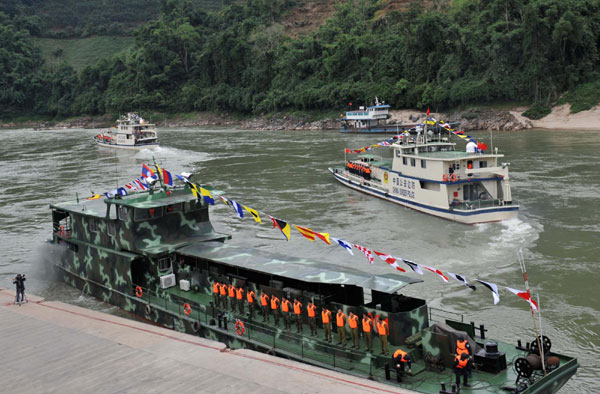China launches joint patrols along Mekong River
(Xinhua) Updated: 2011-12-10 15:54The Mekong River, known in China as the Lancang River, rises on the Qinghai-Tibet Plateau and flows through China, Myanmar, Laos, Thailand, Cambodia and Vietnam before spilling into the South China Sea.
The river plays a crucial economic role throughout the Greater Mekong Subregion (GMS). It also serves as a major bond of the economic cooperation between China and the GMS nations and one of the key transport passages in the China-ASEAN free trade zone.
The river, however, has witnessed increasingly more smuggling of drugs, weapons and ammunition, and attacks on boats over the past couple of years.
The four countries decided to launch joint police patrols in late October, weeks after two cargo ships were attacked on October 5, resulting in the murder of 13 Chinese sailors.
The headquarters for the initiative was established in Xishuangbanna, while liaison offices were set up in the other three countries Friday to share intelligence and coordinate operations.
China has selected more than 200 officers from the country's border police force to form a special police team for the joint patrols along the Mekong River.
Joint police patrols are expected to help restore shipping services, protect the safety of passengers and vessels, as well as reduce crimes along the river, said Meng Hongwei, China's vice minister of public security, on Friday.
The four nations also sought to further build a long-term mechanism on joint patrol cooperation to crack down on crimes and safeguard social order in the Mekong River region, the Ministry of Public Security said in a statement.
 |
|
A Chinese patrol vessel carrying special police departs from Guanlei Port in Xishuangbanna Dai autonomous prefecture in Southwest China's Yunnan province, Dec 10, 2011. [Photo/Xinhua] |
- China's largest Miao village restores its face
- Xi stresses CPC leadership over army
- Fugitive caught near prison
- Celebrity detained for drug use
- Circus tiger kills girl in southwest China
- Ruling on choice of child names clarified
- Police continue hunt for child-stabbing suspect
- China amends law to support citizens suing gov't
- Mahjong expanding 'to every corner of the world'
- No letup for Chinese aid in West Africa's Ebola fight
![Representatives of China, China, Myanmar, Laos and Thailand attends the launching ceremony of joint patrols along Mekong River, at the Guanlei Port in Xishuangbanna Dai autonomous prefecture of Southwest China's Yunnan province, Dec, 10, 2011.[Photo/Xinhua] China launches joint patrols along Mekong River](../../images/attachement/jpg/site1/20111210/001aa018f83f104d4fbf02.jpg)







